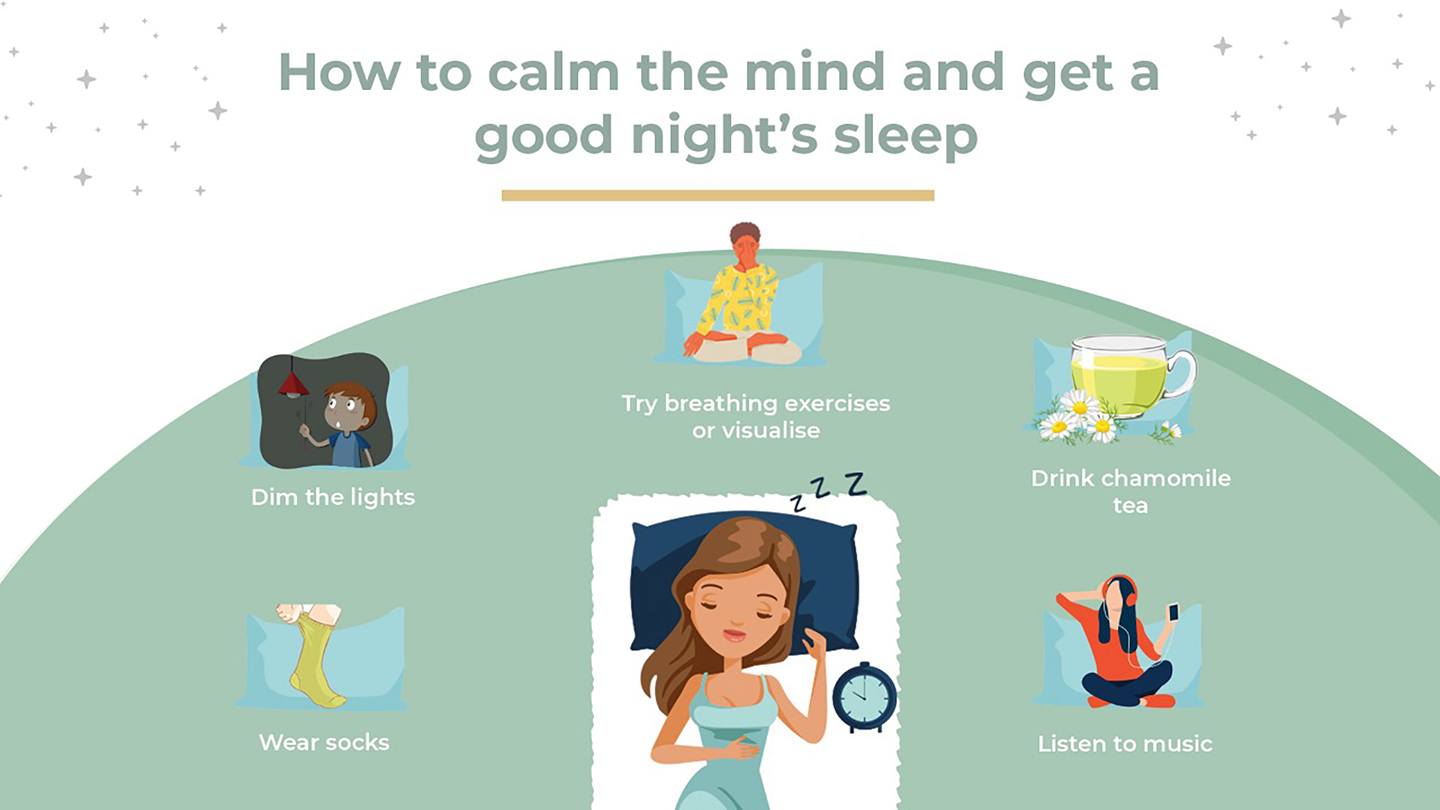Mental Health
How to Calm the Mind and Get a Good Night’s Sleep
Put the brakes on your racing thoughts with these science-backed tips for better sleep.

Put the brakes on your racing thoughts with these science-backed tips for better sleep.
Catching sleep can be as futile as trying to retrieve an email you didn’t mean to send. A good night’s rest helps your brain reset. Poor sleep impacts your memory, hormones and immunity. We dug into research to help you drift off into deep slumber.
Give yourself 10 minutes to wind down. Dim the lights, make sure the room is cool. Low lights trigger the sleep hormone, melatonin. Research shows that the ideal room temperature for sleep is 24.2 C.
Put your phone on silent or mute your notifications. You don’t want to doomscroll in bed. Turn off the television. The idea is to reduce stimulus. A German study found that sudden noise like a car horn or a disturbance at home is worse for sleep than continuous sounds. If traffic noise keeps you up, consider changing your bedroom. You could also use a white noise machine. Studies show that a white noise machine can reduce the time it takes to fall asleep by almost 40%.


Too wired to lie still? Get into bed, starting with your feet, tense and relax the major muscles in your body. “When you squeeze your fist notice your knuckles and fingernails digging into your palm. Then, while releasing focus on the pleasant sensations in your hand,”says Dr C Manjula Rao, consultant clinical psychologist, Apollo Hospitals Jubilee Hills, Hyderabad. The theory is that the mind mirrors the feeling of physical relaxation. Just the act of focusing on your body and not your thoughts is enough to give sleep a chance. As per the Journal of Alternative and Complementary Medicine this technique lowered fatigue and improved sleep quality.
The next time you find yourself replaying conversations in your head, bring the attention to your body. Scan each part to assess where you are tense. Are you unknowingly tensing your shoulders? Are your toes curled? As you scan for tightness, breathe deeply while relaxing those areas. This technique is similar to meditation.


Stop your brain’s flashback reel of awkward moments. Give it something productive to do. Visualise your happy place. Think of a peaceful scene while breathing deeper and slower. “You can also combine visualising with progressive muscle relaxation technique. So when you begin to relax a muscle think of a pleasant scene like the ocean or a happy memory,” says Dr. Rao.
You could also schedule ‘worry time’ where you give yourself a few minutes to think about what’s on your mind. Then visualise resolving your trigger. One way to ensure you stick to the allotted worry time is by reminding yourself of the present moment. “Start by bringing your attention to your surroundings. Notice the details. Keep in mind worrying is just a habit it doesn’t define you,” says Rao.


Not all sounds are sleep deterrents. A study published in PubMed found that listening to soothing music 45 minutes before bed can improve sleep quality from the very first night. It helps you sleep sooner too. Music reduces the stress hormone, cortisol and floods your system with the pleasure hormone, dopamine. High cortisol during bedtime makes you alert and fidgety. Music also triggers psychological responses in the body that can reduce pain.
Studies have found that music that plays at 432 Hz has a significant calming effect. Listen to music with a rhythm of about 60-80 beats per minute to sleep faster. Your heart rate and your breathing will gradually become slower to match those beats.
Technology is not all bad. Apps like Bloom offer DIY cognitive behavioural therapy. Self-help apps make therapy accessible and affordable. Bloom is a great tool for anxiety. The app offers over 500 exercises that you can choose from, ranging from journaling to practicing positive thinking.


This is a weird one but wearing socks to bed can make you sleepy faster. Socks keep your feet warm which opens up blood vessels that cool your body. Hate the idea of socks in bed? Research published in the journal International Journal of Health Sciences and Research offers another trick. Soak your feet in warm water to fall asleep faster and improve the quality of sleep.

EXPLORE MORE
Burnout doesn’t arrive suddenly. Long before exhaustion takes over, the body and mind send subtle signals most of us dismiss.
Beyond early diagnosis and reminders, early intervention has a broader impact that’s frequently overlooked.
AI saves time, but it’s quietly draining our attention and our ability to think critically. Here’s how to regain focus without unplugging from modern life.
Every child worries as they grow up. But when anxiety starts shaping their behaviour, body, and confidence, parents need to pause and look closer. A psychologist explains how to spot the difference early.








.jpg)

